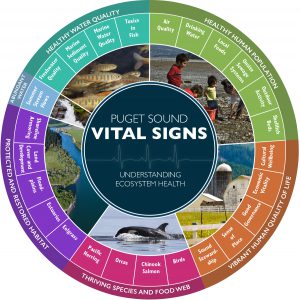The Southern Resident orcas that call Puget Sound home are critically endangered. For the last few years, Washington Conservation Districts—along with dozens of non-profit and agency partners—have provided folks the chance to take action on this critical issue through Orca Recovery Day.
Orca Recovery Day 2020 was a little different. Around 1,160 people participated as volunteers or attendees with the month-long EcoChallenge—which allowed people to choose actions to do on their own or with a team in their homes, neighborhoods, and communities—or at in-person events. Orca Recovery Day participants volunteered 1,138 hours of their time and accomplished the following:
- 4,580 trees or shrubs planted
- 12.83 acres restored
- 4 raingardens installed
- 7,327 lbs. of trash picked up
- 18 rain barrels installed
- 792 student contact hours
- 4,674 pounds of CO2 saved
- 137 elected officials contacted
Although this year’s Orca Recovery Day is over, you can learn more about creating better habits and protecting the environment through Better Ground’s Orca Recovery Day site, or you can connect with your local Conservation District.
Vital Sign connections

The Vital Signs measure the health of Puget Sound and progress toward its recovery.
Orcas
Killer whales, also called orcas, are among Puget Sound’s most distinctive and charismatic inhabitants. They occupy an important niche at the top of the food web. Southern Resident killer whales are a unique population of orcas that ranges in the Salish Sea and the West Coast. Orca Recovery Day mobilizes Puget Sound residents to take action to restore habitat, reduce stormwater pollution, and change their everyday habits to help improve conditions for orcas.
Chinook Salmon
The Southern Resident orcas depend on the endangered Chinook salmon as their primary food source. Orca Recovery Day’s actions focus on restoring habitat and reducing pollution in order to contribute to salmon recovery efforts.
Sound Stewardship
Puget Sound residents engage in environmental stewardship activities that they perceive as meaningful to themselves, their community, and the environment. Thousands of people throughout the Pacific Northwest have participated in Orca Recovery Day over the last couple years. These participants have taken action to improve the health of Puget Sound.
Cultural Wellbeing
The Cultural Wellbeing Vital Sign addresses the extent to which people feel able to maintain their cultural traditions. The Southern Resident orcas are an iconic species of the Pacific Northwest. The orcas are significant for diverse cultures throughout the Salish Sea region. Restoring orca populations contributes to the wellbeing of Pacific Northwest communities.

